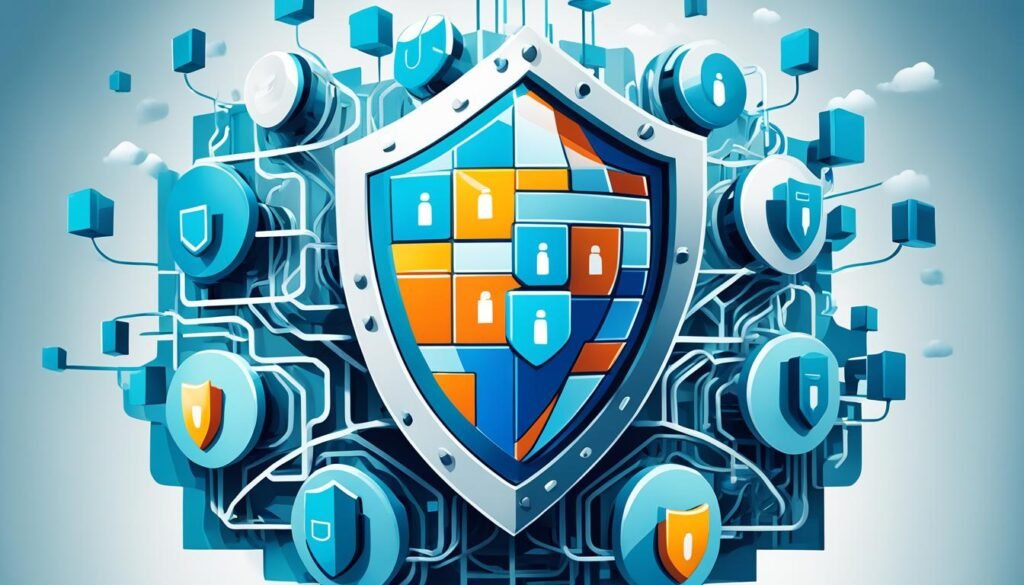What if the key to your business’s online security and smooth operations is a technology you’re not using? As cyber threats grow, keeping your company’s data safe and staying connected is key. A virtual private network, or VPN, for business does just that. It makes sure your network security is top-notch, protects your data, and gives everyone a secure connection.
Now, companies in Europe, the USA, Brazil, and the Asia Pacific are turning to VPNs for safe online deals and working from anywhere. A study in 2022 by AV-TEST GmbH found a VPN service by Kaspersky was the top choice for speed, using over 2,000 servers in more than 100 places worldwide.
So, why do 80% of businesses say VPNs have made them more secure? They offer secure remote access and connect different offices easily. For instance, remote access VPNs let workers safely connect to the company network from anywhere. Site-to-Site VPNs link different offices to a main corporate network without hassle.
Investing in a VPN for your business can cut costs on communication lines, make remote work easier, and protect against threats. In today’s digital world, seeing how a VPN is key to your security plan is crucial.
Introduction to Business VPNs
Today, Virtual Private Networks (VPNs) are key for secure remote connections and protecting company data protection. They create a secure “tunnel” through the internet. This lets remote workers and branch offices safely access company resources, just like they were in the office. It’s vital for keeping internet security and ensuring online privacy.
VPNs are also crucial for safe communication between different offices. They make encrypted connections between locations. This helps in sharing data securely across different places. With strong encryption, VPNs keep data safe from cyber threats.
But, VPNs face some security issues like weak user checks, risky devices, tunnel weaknesses, and split tunneling problems. Despite these, top companies like Cisco, Palo Alto Networks, Check Point Software Technologies, Fortinet, and Citrix offer strong solutions. These meet the needs of various businesses.
Using a business VPN boosts company data protection and supports remote work. It’s a cost-effective way that gives more bandwidth and saves money compared to other network links. For companies wanting to link network security with their physical locations, VPNs are a secure and practical choice.
Types of Business VPNs
Businesses use two main types of VPNs to keep their networks safe and work smoothly from afar. These are remote access VPN and site-to-site VPN. Each type has its own benefits, fitting different business needs.
Remote Access VPNs
Remote access VPN is key for businesses. It lets employees work from anywhere by connecting to the company’s network securely. Even when using public Wi-Fi, data stays safe and private.
The VPN client on a device talks to a network server to make a secure connection. This keeps the network safe.
In 2021, 61% of small to medium-sized businesses in the U.S. faced cyberattacks. A remote access VPN can help fight these threats. It makes data safer and keeps work going smoothly.
This VPN is crucial for remote work today. It boosts productivity and flexibility.
Site-to-Site VPNs
A site-to-site VPN connects different office locations into one network. It’s great for businesses with offices in various places. It makes sharing information secure and easy, without needing extra software on each device.
This approach is cheaper than private MPLS circuits. It’s perfect for sharing important resources across locations. It helps teams work better together, no matter where they are.
Site-to-site VPN also quickly alerts to any unusual activity, like high bandwidth use. This could mean a security issue or malware. Using this secure method helps avoid big problems like data breaches or losing important information.
Why Businesses Use VPNs
Today, businesses struggle to keep remote workers’ connections safe. Using Virtual Private Networks (VPNs) is a key solution. About one-fourth of internet users use personal VPNs, showing its importance.
Secure Remote Work
Secure remote work is vital for modern businesses. VPNs make connections safe by encrypting data between remote workers and the company. This keeps sensitive info safe from hackers.
Many employees work from outside the office, often on public networks. But with VPNs, companies can trust that their data is safe.
Data Encryption
VPNs keep data private with strong encryption. This makes data unreadable to hackers, only for authorized users. It stops unauthorized access and keeps sensitive data safe.
Choosing a VPN with strong encryption is crucial. It affects how fast and secure the data is.
Benefits of a VPN for Businesses
Using a VPN for business brings many VPN benefits that boost business efficiency. A big plus is the enhanced security VPNs offer. They use strong encryption to keep hackers from getting sensitive data. This is key since over 60% of companies have faced cyber threats like DDoS attacks and phishing.
VPNs also add an extra security layer, vital for businesses dealing with financial or customer data. With 65% of cyberattacks targeting small-to-medium businesses, strong security like VPNs is essential. Big names like Google, Amazon, and Disney use secure VPN services like OpenVPN to protect over 100,000 businesses.
VPNs also make businesses more efficient by letting employees work from anywhere. This setup boosts productivity and reduces costs compared to old methods. For companies working across borders, VPNs help access content blocked in certain areas, making global operations smoother.
Choosing a reliable VPN over free ones means getting better performance, speed, and privacy. Premium VPNs like NordVPN offer extra tools to protect against malware and ads. These features make investing in a VPN a smart choice for keeping business safe and efficient.
How a VPN Works
A VPN, or Virtual Private Network, creates a secure encrypted connection between a device and a network. This secure tunneling keeps all data safe from being intercepted. When you use a VPN, your internet traffic goes through a remote server, hiding your IP address and location.
This makes you anonymous and lets you access content blocked in your area.
Several key parts make a VPN work well. Encryption is a big one. VPNs use strong encryption like OpenVPN and SSTP for top security. OpenVPN, for example, uses 256-bit AES encryption, which is very secure.
Network tunneling is also crucial. It keeps data safe as it moves from your device to the VPN server. Protocols like IKEv2/IPSec and L2TP/IPSec boost security and speed, especially for mobile users.
Only 15% of users stick with the old PPTP because it’s not secure. But 40% like SSTP for getting past firewalls and proxy servers.
Server load can slow down a VPN, but 85% of users use them to keep their online activities private. They’re also key for watching shows from different countries.
Knowing how VPNs work shows their value in keeping the internet safe and private. With ongoing tech improvements, VPNs are vital for protecting our data in today’s connected world.
Key Features to Look for in a Business VPN
Choosing the right business VPN is crucial for your company’s security and efficiency. A good VPN should have advanced encryption and work well with cloud services. This ensures your data stays safe and secure.
High-Level Encryption
Encryption is key for a strong VPN. Businesses need to use top encryption like AES-256. This encryption is almost unbreakable, offering military-grade security for your data.
With AES-256, your data stays safe even if it’s caught in transit. This is vital as over 2 billion data records were hacked in December 2023. So, strong encryption is a must.
Compatibility with Cloud Services
Cloud services are more common now, so your VPN must work well with them. A VPN that supports cloud service integration keeps your data safe as it moves between your network and the cloud. This stops unauthorized access and makes connecting to cloud apps secure.
Using a cloud-based VPN can also cut down on support costs. Server upkeep and security are handled by the service provider.
In short, look for a business VPN with strong encryption and cloud service support. These features help keep your data safe and improve your IT security.
Common Risks Mitigated by VPNs
In today’s digital world, VPNs are key for strong internet security and network protection against many cyber threats. They stop data interception by encrypting it. This way, they keep data safe during online transfers.
But, with more people working from home, VPN attacks have jumped by 1,500%. It’s vital for companies to use VPN security to guard against threats. Using top encryption like AES keeps data safe, even on public networks.
VPNs also help fight risks from weak passwords. Verizon found that 76% of network breaches come from bad passwords. With strong multi-factor authentication (MFA), companies can boost VPN security and lower the chance of unauthorized access.
Some solutions, like Citrix Gateway, have security issues. In 2022, some flaws let hackers bypass security and launch attacks. Also, over 49,000 Fortinet VPNs were found to be at risk. This shows the need for regular security checks and updates.
Because of these issues, using Zero Trust Network Access (ZTNA) is getting more important. Gartner predicts ZTNA will grow by 31%, making it the fastest-growing network security area. ZTNA limits access to what users need, reducing risks from too much access.
VPNs are crucial for protecting data and securing remote access. But, they don’t solve all cyber threats. A strong defense needs other steps like secure web gateways and constant monitoring to fully protect a business.
The Difference Between Business and Consumer VPNs

Business VPNs and consumer VPNs have different main uses. A consumer VPN helps individuals stay safe and private online. Business VPNs protect connections to company networks and resources.
Business VPNs support many users, like teams and departments. They have special features for business data security, like dedicated IP addresses and private servers. This means better performance and security than personal VPNs, which share resources.
Business VPNs also have central control. This lets companies manage who can access and what they do online. In contrast, a consumer VPN is for one person. It’s easy to use and doesn’t need much upkeep. But, business VPNs cost more because they have many features for strong business data security.
Business VPNs can grow with your company. You can change plans based on how many users and features you need. This is important for companies that change, like with remote work. Personal VPNs are priced based on how many devices you want to protect and how long you subscribe. They’re great for people who want better online privacy and safety on public Wi-Fi.
In short, business VPNs and personal VPNs are for different people with different needs. Last year, VPN use went up by 124%. Knowing the differences helps pick the right one for your needs.
Challenges and Limitations of Business VPNs
VPNs are key for safe online talks, but they have some VPN limitations. A big worry is security risks. Even though 51% of internet users worldwide used a VPN for privacy on public Wi-Fi in 2023, setting them up can be hard. This can lead to leaks of personal info.
Another big issue is latency issues. VPNs can make the internet slower because of encryption and sending data through far-off servers. This is a big problem for things like video calls or streaming HD videos. It can really slow things down.
Businesses also worry about VPNs dropping connections, which can reveal your real network details. Some VPNs log user data, which goes against privacy and ups security risks. Using VPNs on many devices and platforms can be hard and needs a lot of work to manage.
Cloud complexity makes things even harder. Adding VPNs to cloud services is tricky because of different protocols and encryption weaknesses. This can lead to data theft. Using VPNs to get around censorship laws can also lead to legal issues. It’s important for businesses to check if using VPNs is legal where they are.
VPNs do offer a lot of security, but it’s key to know and deal with these VPN limitations and issues. This helps make sure business operations are safe and secure.
Choosing the Right VPN Provider for Your Business
Choosing the right VPN provider is key for your online success. It affects how well your business works, stays safe, and keeps customers happy.
Reliability and Uptime
Reliability and uptime are very important for a VPN service. Downtime hurts your business by slowing things down and making it less productive. NordVPN, for example, had a small 11% average internet speed drop in 2024 tests, showing it’s reliable.
Mullvad, Surfshark, and Proton VPN also kept speed losses under 25%, proving they’re steady performers. ExpressVPN stands out by allowing eight devices to connect at once, making it great for different business sizes.
Customer Support
Good customer support is a must for quick fixes and smooth operations. It helps solve problems fast, avoiding long outages. NordLayer offers custom solutions with control panels and can grow with your business.
The team’s quick help and know-how are crucial for keeping your service running without a hitch. This makes good customer support a big part of picking a VPN provider.
Virtual Private Network Implementation Tips
For a business, setting up a VPN needs a clear plan and following best practices. It’s important to use setup guides that make adding the VPN easy. Companies like NordLayer make it simple with fast account creation, quick downloads, and quick start-up. This helps boost security without a lot of hassle.
Having a control panel for the VPN is crucial for a secure setup. These panels help keep an eye on VPN use, manage security rules, and fix problems fast. When expanding a business, it’s key to think about how the VPN will grow with it. This means finding solutions that can handle more users and devices without issues.
For businesses wanting an easier deployment, prebuilt VPN solutions are a good choice. They come with full support and settings ready to go, easing the load on IT teams. To set up a VPN, you need to get your gear ready, download/install the VPN client, find tutorials, log in, pick a VPN protocol, and fix any connection problems. Protocols like OpenVPN and L2TP/IPSec offer different levels of speed, privacy, and security for your data.
In summary, a VPN works best with a solid setup plan, easy integration, and good management. Using prebuilt solutions can make the setup smoother, helping businesses get a secure and stable VPN fast.
The Future of Business VPNs
The future of VPN technology is moving towards cloud-based security solutions. Concepts like SASE (Secure Access Service Edge) are becoming more popular. Companies are leaving behind traditional VPNs for newer technologies like SD-WAN.
These new solutions aim to provide secure access to applications and data from anywhere. They ensure smooth connections and strong security. This is a big step towards a safer internet for everyone.
One major trend is the use of Zero-Trust Security Models. These models check the identity of every user, device, and system all the time. This is important because it helps protect against threats in today’s digital world.
Now, more than 1.5 billion users and 93% of companies rely on VPNs. Thanks to AI and Machine Learning, VPNs are getting better and more user-friendly. This makes them more efficient and tailored to each user’s needs.
Another important change is the use of quantum-resistant encryption. This keeps data safe from future threats. Blockchain-based VPNs also add an extra layer of security by using a decentralized network.
VPN-as-a-Service (VPNaaS) is making it easier for companies to get the security they need. It offers flexible solutions for a workforce that is always on the move. With new technologies like 5G and edge computing, VPNs will become even more powerful and efficient.


